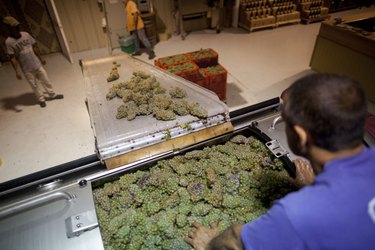
Potassium metabisulfite is a food preservative, which preserves the natural color of food and protects food against bacteria. Winemakers also use potassium metabisulphite to preserve bottled wines. The manufacturing industry uses potassium metabisulphite as a dye and printing agent, in gold processing and in photography for developing.
Potassium Metabisulfite
Video of the Day
Potassium metabisulfite is a white crystalline powder that has a strong sulfur odor. Additionally, potassium metabisulfite is a disulfite and has a melting point of 374 degrees Fahrenheit. Some potential dangers associated with exposure to this substance include severe burning and damage to your eyes, irritation and reddening of your skin and difficulty breathing. If exposed to the raw, unprocessed form of potassium metabisulfite, you should immediately seek medical attention. Flush your eyes with water for 15 minutes and use water to remove any of the substance from your skin.
Video of the Day
Wine
The winemaking industry uses potassium metabisulfite as an additive during the bottling process. When they add potassium metabisulfite to the wine, a sulfur dioxide gas forms, which destroys microorganisms in the wine and prevents molds and bacteria from growing inside the wine bottle. Additionally, potassium metabisulphite is a strong antioxidant that protects the color and flavors of the wine. Without the use of potassium metabisulfite, wines would develop a stronger taste over time as the wine ages in the bottle. One quarter teaspoon of potassium metabisulphite can treat approximately five gallons of wine.
Other Uses
In the food industry, manufacturers use potassium metabisulphite to preserve the taste of dehydrated foods and to make these foods more palatable. Potassium metabisulphite cannot preserve certain kinds of foods, including raw fruits, vegetables and meats. However, the substance can preserve fruits as part of the canning or dehydration process.
Caution
Potassium metabisulphite is an allergen for some individuals. If you have allergies to other food preservatives, you may also have or develop an allergy to potassium metabisulphite. If you experience difficulty breathing, swelling of your extremities, difficulty swallowing or a rash or welts on your skin after consuming potassium metabisulphite, you should immediately stop consuming all products that contain this substance and seek medical attention.